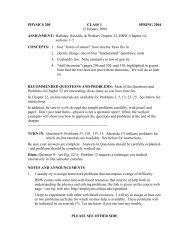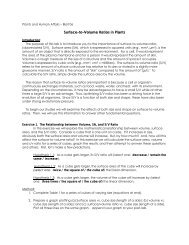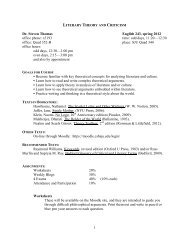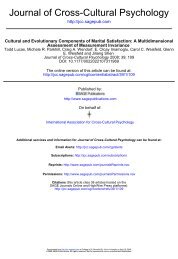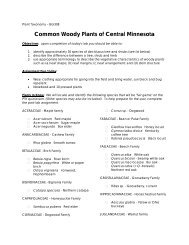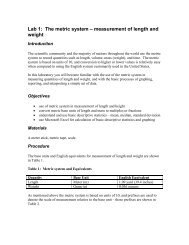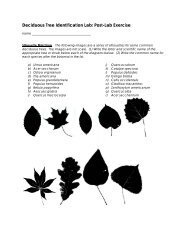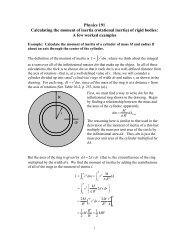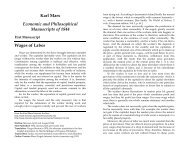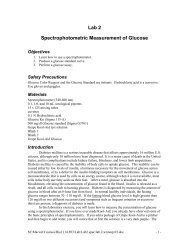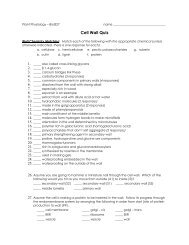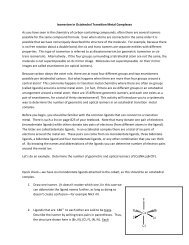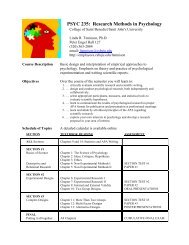ENGLISH 382 SYLLABUS RACE AND ETHNICITY IN U.S. ...
ENGLISH 382 SYLLABUS RACE AND ETHNICITY IN U.S. ...
ENGLISH 382 SYLLABUS RACE AND ETHNICITY IN U.S. ...
Create successful ePaper yourself
Turn your PDF publications into a flip-book with our unique Google optimized e-Paper software.
<strong>ENGLISH</strong> <strong>382</strong> <strong>SYLLABUS</strong><br />
<strong>RACE</strong> <strong>AND</strong> <strong>ETHNICITY</strong> <strong>IN</strong> U.S. LITERATURES<br />
Dr. Steven Thomas English <strong>382</strong>, fall 2008<br />
office phone: x3193<br />
time: odd days, 9:40—10:50 am<br />
office: SJU Quad 352-B place: SJU Quad 254<br />
e-mail: swthomas@csbsju.edu<br />
office hours:<br />
odd days 11:00 am—noon; even days 2:15—3:00 pm<br />
and also by appointment<br />
THE IDEA OF THE COURSE<br />
This course will focus on novels, stories, poems, and essays written by American authors who are<br />
members of prominent ethnic or minority communities within the U.S., specifically African-<br />
American, Asian-American, Native-American, Latino/a, and other communities living in<br />
diaspora. As we read the literature, we will explore such questions as: what is race, what is<br />
ethnicity, what role do race and ethnicity play in the texts by minority authors, what is<br />
American, and perhaps most importantly, what role do race and ethnicity play in how we<br />
appreciate not only minority literatures in particular but also American literature in general<br />
In addition to race and ethnicity, we will also reflect on key concepts such as diversity,<br />
representation, multiculturalism, transnational, freedom, justice, hybridity, diaspora, migration,<br />
borders, globalization, and community. To help us with such re-conceptualizations of American<br />
literature (and of our society in general), we will read some short essays that pose arguments not<br />
only about literature but also about the social nature of identity and what it means to belong.<br />
TEXTS <strong>IN</strong> BOOKSTORE<br />
Toni Morrison, Playing in the Dark<br />
Toni Morrison, The Bluest Eye<br />
Louise Erdrich, Love Medicine<br />
Chang-Rae Lee, Native Speaker<br />
Josefina Lopez, Real Women Have Curves<br />
Dinaw Mengestu, The Beautiful Things that Heaven Bears<br />
Jeff Chang, Can’t Stop Won’t Stop: A History of the Hip Hop Generation<br />
WHAT WE WILL DO<br />
The course will be organized around six units. Each unit explores a different way to approach<br />
race and ethnicity in American literature. We will begin each unit with an open discussion of<br />
some theoretical questions. Then, on day two, I will lecture on some of the themes, theoretical<br />
concepts, historical context, and biographies of the authors. On the remaining days, we will have<br />
a mix of student presentations and class discussion about the assigned texts. On the final day of<br />
the unit, you will come to class with a one page, single spaced essay on the assigned reading. You
will spend the first half of the class time in small groups discussing what you wrote, and then you<br />
will spend the second half of class time re-envisioning your essay by writing on the back of it.<br />
For one unit, instead of turning in a short essay at the end of the unit, you will give a short<br />
presentation to the class.<br />
In addition, for one of the units, you and one other student from your group will team up to lead<br />
class conversation about the texts assigned for that day.<br />
Finally, at the conclusion of the semester, you will take either one of your short essays or your<br />
presentation and develop it into a longer 3-4 page, single spaced essay. We will devote some class<br />
time to work-shopping this essay, and you will have to share with the class what you are working<br />
on.<br />
ASSIGNMENTS <strong>AND</strong> GRAD<strong>IN</strong>G<br />
Five one-page, single spaced essays ……………………. 10% each (50% total)<br />
Presentation …………………………………………….. 10%<br />
Discussion leading ……………………………………… 10%<br />
Final Paper ……………………………………………… 15%<br />
Attendance and Participation …………………………… 15%<br />
ONE-PAGE ESSAYS<br />
Your essays will answer one or more of the questions posed by engaging with at least three of the<br />
texts assigned for that unit (and one of these must be the primary long text.) I will grade you on<br />
(1) how well you formulate and answer the question, (2) how well you support your claims with<br />
evidence from the texts, and (3) your reasoning and organization.<br />
Your essays should be exactly one page – no more, no less – single spaced, using 11 point Times<br />
New Roman font, with one inch margins. As for the header, at the top left, put your name and<br />
date, and at the top right, put the name of this class – English <strong>382</strong> -- and the number of the paper<br />
(e.g., Paper #). There should be one line of space between the header and the essay, and no title.<br />
On the back of your essay, after 40-45 minutes of group discussion, you will re-think what you<br />
wrote based on the conversation you had with your group. Your in-class essay will be graded on<br />
(1) how honestly you reconsider the texts, (2) how well you draw upon the conversation with<br />
your group, and (3) how well you support your new ideas with evidence from the texts.<br />
So that your group has an archive of your work, submit your essay to your group’s forum for each<br />
unit. Please do so after the group discussion – and not before. Feel free to continue conversing<br />
with each other in the forum about the topic for that unit.<br />
PRESENTATION<br />
For one unit – instead of writing an essay – you will give an oral presentation in class. Each of<br />
you must sign up for a unit at the beginning of the semester.<br />
In contrast to the essay, your presentation should be more open-ended so as to invite further
discussion and debate among your class-mates. Begin with a question (or set of questions) and<br />
entertain more than one possible answer to that question. Ultimately, you should clearly argue for<br />
one of those answers and have a strong thesis, but begin with the possibility that there is more<br />
than one way to look at the various texts before you. As with your essay, support your argument<br />
with evidence from the texts.<br />
Also, your presentation should bring in outside information – perhaps some historical context or<br />
biographical information that you looked up on your own. You may even have some video, audio,<br />
or images to show.<br />
At the end of your presentation, you should return to the questions with which you began and<br />
invite the class to respond and discuss. Your presentation should be at least 10 minutes and no<br />
longer than 25 minutes, including the time for class discussion.<br />
At least one full class day in advance of your presentation date, you should submit an outline and<br />
bibliography of your presentation to Moodle so the rest of the class can see it ahead of time. I also<br />
encourage you to meet with me even earlier than that to discuss your plans.<br />
DISCUSSION LEAD<strong>IN</strong>G<br />
You will do this assignment in pairs, and at the beginning of the semester, you and your partner<br />
should sign up for a day. Considering that you will be working in groups of four for most of the<br />
semester, probably the easiest thing for you to do would be to divide your group in half for this<br />
assignment.<br />
For this assignment, I give you free reign for how you want to organize the class discussion, and I<br />
encourage you to speak with me as soon as possible about what you can or might do. I suggest<br />
you submit a plan to Moodle at least one full class day ahead of time so that your classmates<br />
know how to prepare for your discussion. You will be graded on your effort.<br />
F<strong>IN</strong>AL PAPER<br />
Take either one of your five essays or your presentation and develop it into a 3-4 page paper<br />
(single spaced). Probably, you will significantly revise or re-think your earlier paper/presentation<br />
and come up with a slightly different set of questions, research agenda, and/or thesis. The goal of<br />
this assignment is for you to develop a critical apparatus for analyzing race and ethnicity in<br />
American literature. You will learn more about what a “critical apparatus” is over the course of<br />
the semester, but for now consider it to be something like a conceptual “lens” through which you<br />
“read” literature or “see” culture. (Hint, each of the units for this course centers on a different<br />
“critical apparatus.” In your final paper, you may want to come up with your own apparatus and<br />
distinguish it from one or more of the apparatuses we dealt with in the class.)<br />
You should arrange to see me to discuss your plan as soon as you can, and I expect you to consult<br />
at least two secondary sources through the MLA bibliography or JSTOR (library databases). If<br />
you are unsure what the difference is between a primary and a secondary source, or if you do not<br />
know how to use those databases, please ask.<br />
As with your five short essays, your final paper will be graded on (1) how well you formulate<br />
your critical apparatus, (2) how well you support your claims with evidence from the texts, and
(3) your reasoning and organization.<br />
As for the format, this paper should be single spaced, 11 point font, one-inch margins just like the<br />
other five shorter essays. For this paper, however, you should have a title in bold face between<br />
the header and your essay. You should also add a Works Cited at the end, which need not be a<br />
separate page, but should be distinguished and properly formatted according to MLA style<br />
guidelines.<br />
ATTENDANCE <strong>AND</strong> PARTICIPATION<br />
I expect you to come to class on time everyday. If you miss more than three classes, I will lower<br />
your grade as I deem appropriate.<br />
Participation means not just talking, but also listening, respecting your classmates, and being<br />
prepared (i.e., having completed the reading assignment.)
SCHEDULE OF UNITS<br />
Unit One –What, Why, and How<br />
Questions:<br />
What do we mean when we say we are studying minority literature<br />
Why do we study race and ethnicity in American literature<br />
How ought we to go about it<br />
Texts:<br />
Toni Morrison, Playing in the Dark, preface and ch. 1<br />
Ralph Ellison, “Introduction” and “Prologue” to The Invisible Man<br />
Walt Whitman, “I Hear America Singing”<br />
Langston Hughes, “I, too” and “Theme for English B”<br />
John Sayles, Lone Star (movie)<br />
Calendar:<br />
Aug. 27 (W) first day of class<br />
Aug. 29 (F) Whitman; Hughes; Ellison “Introduction”<br />
Sept. 2 (T) Playing in the Dark, preface; Ellison “Prologue”<br />
**Sept. 2 & 3 7:30 pm night screenings of John Sayles’s Lone Star in Quad 346<br />
Sept. 4 (Th) Playing in the Dark, ch. 1; Lone Star<br />
Sept. 8 (M) unit one paper due<br />
Unit Two – Identity, Representation, and Figuration<br />
Questions:<br />
How does representation work Can individuals represent communities<br />
Is artistic representation a “mirror to nature” In other words, does it reflect identity<br />
Or, rather, does the act of representation change and even produce identity<br />
How is representation (and perhaps also identity) always figurative metaphorical<br />
Texts:<br />
Toni Morrison, The Bluest Eye<br />
Toni Morrison, Playing in the Dark, ch. 2-3<br />
Rob Ebstein, et al., The Celluloid Closet (movie)<br />
Axis of Evil Comedy Tour and Arab American Comedy Tour (movies)<br />
Li-Young Lee, “Mnemonic” and “Persimmons”<br />
Calendar:<br />
Sept. 10 (W) Playing in the Dark, ch. 2<br />
Sept. 12 (F) Bluest Eye pp. 1-58<br />
Sept. 16 (T) Bluest Eye pp. 59-93, Playing in the Dark ch. 3<br />
Sept. 18 (Th) Bluest Eye pp. 94-183<br />
Sept. 22 (M) Bluest Eye pp. 184-216; Li-Young Lee, “Mnemonic” and “Persimmons”<br />
Sept. 24 (W) HERITAGE DAY<br />
Sept. 25 (Th) unit two paper due<br />
Unit Three – Hybridity and Dialectic<br />
Questions:<br />
Are our identities stable, changeable, singular, multiple, or hybrid
Is there such a thing as authenticity In other words, is there such thing as authentic<br />
“black” or “white” or “red” culture<br />
What does the word “hybridity” mean and what is difficult about it In other words,<br />
given the complexity of social relations, which often include relations of power,<br />
how does one represent hybridity in literature or experience hybridity in life<br />
What does the word “dialectic” mean, and how can we think of identity and culture<br />
dialectically<br />
Texts:<br />
Louise Erdrich, Love Medicine<br />
W. E. B. Du Bois, “Forethought” and “Of Our Spiritual Strivings” from The Souls of<br />
Black Folk<br />
Zitkala Sa, “Impressions of an Indian Childhood” and “School Days of an Indian Girl”<br />
James Baldwin, “Encounter on the Seine: Black Meets Brown” and<br />
“A Question of Identity” from Notes of a Native Son<br />
Calendar:<br />
Sept. 29 (M) Du Bois and Sa<br />
Oct. 1 (W) Baldwin and Love Medicine, 1-42<br />
Oct. 2-5 FALL BREAK<br />
Oct. 7 (T) Love Medicine, 43-258<br />
Oct. 9 (Th) Love Medicine, finish<br />
Oct. 13 (M) unit three paper due<br />
Unit Four – Diversity, Class, and Redistributive Justice (or, “multiculturalism and its discontents”)<br />
Questions:<br />
What does the word diversity mean Are there false and true forms of diversity<br />
What are the conceptual limitations of “diversity” for thinking about justice, rights, and<br />
relations of power<br />
If diversity is to be valued, how so Or is there a better concept that we can use<br />
Texts:<br />
Chang-Rae Lee, Native Speaker<br />
Nancy Fraser, “From Redistribution to Recognition Dilemma’s of Justice in a<br />
Postsocialist Age” from Justice Interruptus<br />
Richard Wright, “The Ethics of Living Jim Crow”<br />
Spike Lee, Do the Right Thing (movie)<br />
selections from Richard Rodriguez, Hunger of Memory and Tomas Rivera’s response<br />
Calendar:<br />
Oct. 15 (W) Wright and Native Speaker pp. 1-46<br />
Oct. 17 (F) Fraser and Native Speaker pp. 47-81<br />
Oct. 21 (T) Native Speaker, 82-188<br />
Oct. 23 (Th) Native Speaker, 189-249<br />
Rodriguez and Rivera<br />
Oct. 27 (M) finish Native Speaker<br />
watch “Fallen Beats” by Dhaba Wayessa on www.ogina.org<br />
evening presentation by Dhaba Wayessa, time to be announced<br />
Oct. 29 (W) unit four paper due
Unit Five – Borders, Migrations, and Diaspora<br />
Questions:<br />
What social conditions produce borders<br />
What social conditions are produced by borders<br />
What role does literature have in representing the movement of peoples<br />
How does literature not just represent but also participate in the movement of peoples<br />
Texts:<br />
selections from Lola Alcaraz, Migra Mouse<br />
Sandra Cisneros, “Mericans” and “Barbie-Q”<br />
selected passages from Gloria Anzaldua, Borderlands/La Frontera<br />
Josefina Lopez, Real Women Have Curves (play and movie)<br />
Deadwood, season one<br />
Vine Deloria, Jr., “Indian Affairs 1973: Hebrews 13:8”<br />
“Gold Rush Brides” by 10,000 Maniacs<br />
Calendar:<br />
Oct. 31 (F)<br />
Nov. 4 (T)<br />
Nov. 6 (Th)<br />
Nov. 10 (M)<br />
Nov. 12 (W)<br />
Alcaraz, Cisneros, and Anzaldua<br />
Real Women Have Curves (play)<br />
Real Women Have Curves (movie)<br />
Deadwood, season 1, episodes 1-3 plus history on special features<br />
Vine Deloria, Jr., “Indian Affairs 1973: Hebrews 13:8”<br />
unit five paper due<br />
Unit Six – Multicultural Nations / Multinational Cultures<br />
Questions:<br />
How do the concepts multicultural, transnational, multinational, global, diaspora, and<br />
post-national differ What do we mean when we use them Why use them<br />
What does it mean to celebrate a multicultural nation in a globalizing world<br />
What are the limits of multiculturalism for conceptualizing literature and society<br />
Instead of multiculturalism, how might other concepts change our understanding of how<br />
literature and culture work<br />
Texts:<br />
Dinaw Mengestu, The Beautiful Things that Heaven Bears<br />
selected passages from Rebecca Haile, Held at a Distance<br />
Steven Thomas, “Ethiopia and Oromia in the American Literary Imagination” and/or<br />
“An Oromo Renaissance” at www.ogina.org<br />
Nick and Marc Francis, Black Gold (movie)<br />
Lorna dee Cervantes, “Visions of Mexico while at a Writing Symposium in Port<br />
Townsend, Washington”<br />
Gerald Vizenor, TBA<br />
Calendar:<br />
Nov. 14 (F)<br />
Nov. 18 (T)<br />
Nov. 20 (Th)<br />
Nov. 24 (M)<br />
Nov. 56-30<br />
Dec. 1 (M)<br />
Beautiful Things, Thomas<br />
Beautiful Things, Haile<br />
Beautiful Things, Cervantes<br />
finish Beautiful Things,<br />
THANKSGIV<strong>IN</strong>G BREAK<br />
unit six paper due
Conclusion – Individual Research<br />
Questions:<br />
Reflect on the previous six essays you have written so far and come up with your own<br />
question. Formulate a modest research agenda – drawing from previous work –<br />
to develop an answer.<br />
Texts:<br />
Jeff Chang, Can’t Stop Won’t Stop: A History of the Hip Hop Generation<br />
Calendar:<br />
Dec. 3 (W)<br />
Dec. 5 (F)<br />
Dec. 9 (T)<br />
Dec. 11 (Th)<br />
final paper topics workshop – refine research agenda<br />
begin Can’t Stop Won’t Stop, pp. xi-39<br />
research day<br />
read as much as you can of Can’t Stop Won’t Stop<br />
rough drafts of final paper, presentations and workshop



